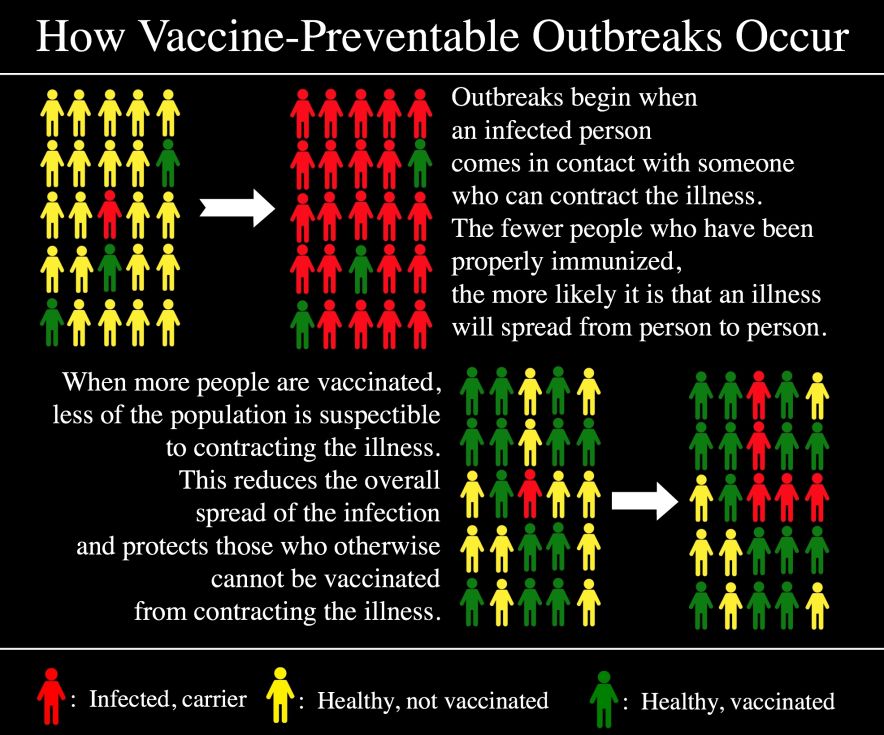In recent years, parents have been choosing to opt out of having their children vaccinated. As a result, vaccine-preventable diseases are subject to return. The frequency of outbreaks of these diseases has increased due to non-immunization and under-immunization.

Vaccines have been around for centuries. The Chinese used inoculation techniques to fight against smallpox in as early as 1000 AD. Similar techniques were also used in ancient Africa and Turkey. The first time vaccine promotion was used in the United States was in 1721 when a Puritan Minister Cotton Mather had encouraged small pox vaccination in response to an outbreak.
Vaccinations that are practiced today came into the picture when Edward Jenner created the first smallpox vaccine using cowpox to vaccinate an eight-year-old boy in 1796. After coming in contact with cowpox, the boy was ill for several day; however, he fully recovered and, when he later was inoculated with matter from a fresh smallpox sore, he remained healthy.
Jenner’s innovation had been used for 200 years, with updates, and eradicated smallpox. The creation of vaccines was an innovative medical advancement that was accepted for centuries and helped raise the length and quality of life for people. In recent years, citizens have started to fear vaccinations.
Over the past couple decades, people have believed that vaccinating children causes autism. In 1998, Dr. Andrew Wakefield wrote an article claiming that the measles, mumps and rubella vaccines were associated with autism. Parents and anti-vaccination groups then began using Wakefield’s article, which has since been retracted, as a way to opt-out of vaccinating their children.
In 2016, 19.5 million infants worldwide had not received the basic vaccines that prevent diphtheria, whooping cough and lock jaw. 20.8 million children have failed to receive even a single dose of the measles-containing vaccine.
There is no U.S federal laws that mandate vaccinations, but all 50 states require certain vaccinations for children entering public schools; however, most states offer medical and religious exemptions and some states even allow philosophical exemptions.
Kristi Batche, a nursing assistant at Goryeb Children’s Hospital and a mother, believes that schools should enforce vaccination the way they enforce limitations on lunches. Batche feels that students cannot eat certain foods on school premises because it is potentially dangerous to other children and the same situation applies to carrying diseases.
“If my child can’t bring in peanut butter, then your child should not be able to bring communicable diseases,” Batche said.
Having had a daughter that had cancer, Batche had to be careful who was around her daughter. During treatment, her daughter was more susceptible to contracting an illness. Recently, there have been measles and mumps outbreaks due to children not being vaccinated.
“It is also unfair to children who are unable to receive vaccines due to compromised immune systems,” Batche said. “There are many children who are unable to receive vaccinations because of this, and many other reasons, that you are putting at risk by keeping your child unvaccinated.”
Vicki Miscisak is a mother to two children, a girl and an autistic boy. After witnessing eradicated diseases returning, Miscisak wants to make vaccines mandatory.
Miscisak said, “Anyone that comes into this country needs to be vaccinated. As you see, they have brought back measles, whooping cough and TB.”
CJ Stadler Post is also a mother and recognizes that while deciding to vaccinate can be complicated, it is often best for children to be vaccinated.
“Vaccinations are difficult decision for many parents,” Stadler Post said. “However, in my case, when my son was an infant, it was the best choice. Certain illnesses can have potentially harmful effects on our children. Illnesses such as Polio can leave a child paralyzed. Measles and mumps are not harmless either.”





Vaccination is another name for extermination. The toxic cocktails they are injecting into our children are murder and attempted murder and who ever the murderer is injecting these into babies has blood on their hands ….American blood!